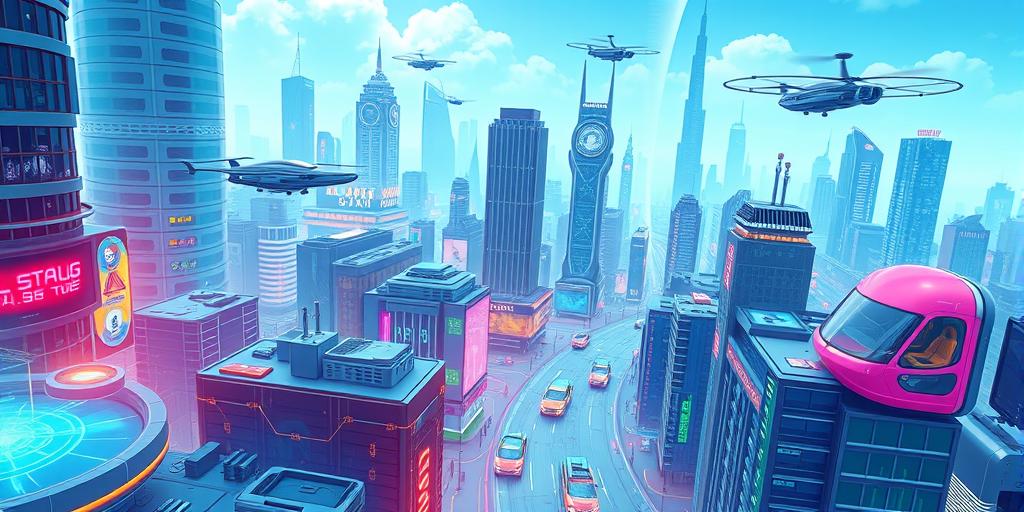Step into a world where your refrigerator orders groceries, your car drives itself, and your home anticipates your needs before you even think of them. This isn’t science fiction; it’s the rapidly approaching reality of the Internet of Things (IoT) in 2050. Buckle up, because the future is intelligent, connected, and profoundly transformative.
The Ubiquitous IoT: Seamless Integration into Daily Life
By 2050, IoT won’t just be a collection of smart devices; it will be the invisible thread connecting every aspect of our lives. Imagine a world where your health is constantly monitored by wearable sensors, your energy consumption is automatically optimized, and your city infrastructure adapts to your individual needs. This level of seamless integration promises unprecedented convenience and efficiency. The seamless integration of IoT into daily life is made possible by advancements in areas like 6G networks, and AI-powered machine learning. This will allow for faster data processing and more sophisticated applications. This pervasive connectivity promises to revolutionize industries and daily routines, paving the way for a truly smart world. We’ll explore the advancements in AI and edge computing that contribute to this seamlessly connected future, as well as discussing the potential impact on various sectors, like healthcare, transportation, and manufacturing.
Advanced Sensors and Data Analytics
The foundation of this interconnected world will be a vast network of incredibly sophisticated sensors capable of collecting and analyzing enormous quantities of data. This data will be used to inform everything from preventative healthcare to optimizing traffic flow, creating a dynamic and responsive environment. Think of it like having a constant stream of information about your surroundings, empowering proactive decision making on an unprecedented scale. Real-time analysis will allow for immediate responses and predictions, minimizing disruptions and maximizing efficiencies. The combination of advanced sensors and data analytics creates a powerful feedback loop, constantly refining processes and improving outcomes.
The Rise of AI-Driven Automation
Artificial intelligence will play a pivotal role in managing the flood of data generated by billions of connected devices. AI algorithms will not only analyze this data but will also learn from it, adapting and optimizing processes with minimal human intervention. Imagine self-healing infrastructure, predictive maintenance for appliances, and personalized healthcare plans tailored to your individual genetic makeup. The rise of AI-driven automation will streamline processes, reduce human error, and create a more sustainable and efficient world. This increase in automation will free up human resources to focus on creative and strategic tasks, fostering greater innovation and productivity.
IoT and the Transformation of Industries
The impact of IoT on various industries will be nothing short of revolutionary. Let’s look at some key examples:
Healthcare Revolutionized
Imagine a world where chronic diseases are detected and managed long before they become serious health risks, a world where personalized medicine is commonplace, and where healthcare is available to everyone regardless of location. The Internet of Things will play a critical role in this healthcare revolution. Wearable sensors constantly monitor vital signs, while AI analyzes the data to predict potential problems before they arise. Remote patient monitoring systems allow doctors to keep a close eye on their patients, reducing hospital readmissions and improving patient outcomes. The IoT enables efficient resource allocation, reducing costs and improving access to healthcare for people in remote areas.
Smart Cities: Efficiency and Sustainability
Smart cities harness the power of IoT to enhance efficiency, sustainability, and the quality of life for their citizens. Smart traffic management systems reduce congestion and improve air quality; smart grids optimize energy distribution, minimizing waste and lowering costs; and smart waste management systems optimize waste collection routes and reduce landfill waste. IoT sensors monitor environmental conditions, providing real-time information that can be used to make informed decisions about urban planning and resource management. This improved efficiency contributes to a cleaner and more livable urban environment.
The Future of Transportation
Self-driving cars are only the beginning. IoT will transform transportation by creating a more connected, efficient, and safer system. Connected cars share real-time information about traffic conditions, allowing for optimal route planning and reducing congestion. Smart infrastructure monitors the condition of roads and bridges, facilitating preventative maintenance and reducing the risk of accidents. The seamless integration of public transport systems, through real-time data and optimized scheduling, reduces travel times and improves the overall commute experience. This intelligent transport network will dramatically change how we travel and transport goods in the coming decades.
Challenges and Considerations
While the future of IoT is bright, it’s important to address the challenges and considerations that come with it. Data security and privacy are paramount concerns. Ensuring the responsible use of data and the protection of individual privacy is crucial to maintain public trust and prevent misuse. The ethical implications of widespread automation must be carefully examined to minimize job displacement and ensure equitable access to the benefits of IoT technology. The need for robust cyber security measures to safeguard connected devices and networks from attacks and data breaches is paramount. Addressing these challenges will be key to realizing the full potential of the IoT while minimizing its risks.
Embrace the future. The world of IoT in 2050 is one of unprecedented possibilities. Are you ready to join the intelligent revolution?




